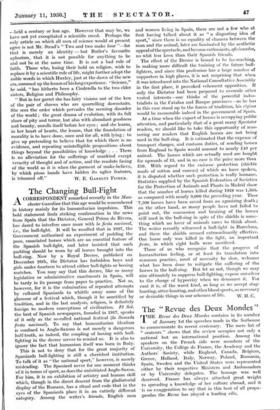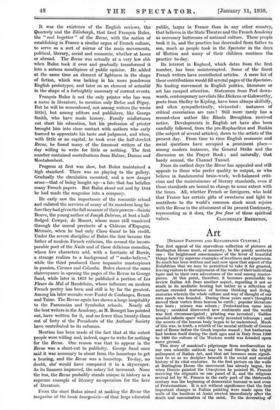The " Revue des Deux Mondes "
THE Revue des Deux blondes contains in its number of January 1st the speeches made in the Sorbonne to commemorate its recent centenary. The mere list of " orateurs " shows that the review occupies not only a national but an international position. Among the speakers on the French side were members of the University, the College de France, the Academy and the Authors' Society, while England, Canada, Belgium, Greece, Holland, Italy, Norway, Poland,, Rumania, Spain, Sweden and the United States were represented either by their respective Ministers and Ambassadors or by University delegates. The homage was well deserved. France has always attached great weight to spreading a knowledge of her culture abroad, and it "is no exaggeration to say that in this best of all propa• gandas the Revue has played a leading role. It was the existence of the English reviews, the Quarterly and the. Edinburgh, that fired Francois Buloz, the " real begetter " of the Revue, with the notion of establishing in France a similar organ of French culture, to serve as a sort of mirror of the main movements, political, literary, social and economic, whether at home or abroad. The Revue was actually at a very low ebb when Buloz took it over and gradually transformed it into a serious mouthpiece of public opinion. He added at the same time an element of lightness in the shape of fiction, which was lacking in his more ponderous English prototypes, and later on an element of actualiti in the shape of a fortnightly summary of current events.
Francois Buloz is not the only printer who has won a name in literature, to mention only Defoe and Peguy. But he will be remembered, not among writers (he wrote little), but among editors and publishers, like George Smith, who have made history. Family misfortunes cut short his education, but his profession of printer brought him into close contact with authors who early learned to appreciate his taste and judgment, and when, with little or no capital, he took over the half-derelict Revue, he found many of the foremost writers of the day willing to write for little or nothing. The first number contained contributions from Baizac, Dumas and Montalembert.
Progress at first was slow, but Buloz maintained a high standard. There was no playing to the gallery. Gradually the circulation mounted, and a new danger arose—that of being bought up—a fate that has befallen many French papers. But Buloz stood out and by 1844 he had made the magazine into a company.
He early saw the importance of the romantic school and enlisted the services of many of its members long be- fore they had given the full measure of their powers—Sainte Beuve, the young author of Joseph Delorme, at best a half- fledged Cowper, de Musset, whose muse still wandered through the unreal precincts of a Chateau d'Espagne, Merimee, when he had only Clara Gazul to his credit. Under the severe discipline of Buloz the first became the father of 'modern French criticism, the second the incom- parable poet of the Nuits and of those delicious comedies, whose live characters add, with a foretaste of Barrie, a strange realism to a background of " make-believe," while the third produced those impassive masterpieces in passion, Carmen and Colomba. Buloz showed the same clairvoyance in opening the pages of the Revue to George Sand, while later in 1855 he published a portion of Les Fleurs du Mal of Baudelaire, whose influence on modern French poetry has been and still is by far the greatest. Among his later recruits were Fustel de Coulanges, Renan and Taine. The Revue again has shown a large hospitality to the Parnassian and Symbolist schools. Nearly all the best writers in the Academy, as M. Bourget has pointed out, have written for it, and no fewer than twenty-three out of forty of the Presidents of the Authors' Society have contributed to its columns.
Mention has been made of the fact that at the outset people were willing and, indeed, eager to write for nothing for the Revue. One reason was that to appear in the Revue was a short-cut to publicity. George Sand once said it was necessary to shout from the housetops to get a hearing, and the Revue was a housetop. To-day, no doubt, she would have compared it to a skyscraper. As its finances improved, the salary list increased. None the less, the Revue probably stands unique in history as a supreme example of literary co-operation for the love of literature.
From the start Buloz aimed at making the Revue the magazine of the haute bourgeaisie—of that large educated public, larger in France than any other country, that believes in the State Theatre and the French Academy as necessary buttresseS of national .cult-tire. These people took it in, and the practice has descended from father to son, much as people took in the Spectator in the days of Hutton and many of their children continue the practice. to-day. .
Its interest in England, which dates from the . first number, has been uninterrupted. Some' of the finest French writers have contributed articles. A mere list Of these contributions would fill several pages of the Spectator. No leading.movement. in English politics, literature or art has escaped attention. Statesrhen from Peel down, . wards, contemporary-novelists like Dickens or Galworthy, poets from Shelley to Kipling, have been always skilfully, and often sympathetically, vivisected : instances of critical excoriation are rare I . Still more rarely has a second-class author like Rhoda Broughton received notice. Developments in English art have' also been carefully followed, from the pre-Raphaelites and Ruskin (the subject of several articles), down to the artists of the present day. From time to time English economic and social questions have occupied a prominent place— among modern instances, the General Strike and the discussion on the Prayer Book ; .and naturally, that hardy annual, the Channel Tunnel.
From its earliest days the Revue has appealed and still appeals to those who prefer quality..to output, or who believe in fundamental brain-work, well-balanced criti- cism and the maintainence of literary standards, even if those standards are bound to change to some extent with the times. All; whether French or foreigners, who hold that France has certain gifts of sweetness and light • to contribute to the world's common stock must rejoice with the Revue in the attainment of its present Centenary',,z representing as it does, the fine Fleur of . these spiritual







































 Previous page
Previous page